
Will the new von der Leyen Commission deliver on climate policy?
Yesterday, during its first plenary session, the newly elected European Parliament confirmed Ursula von der Leyen as President of the European Commis...
News

Publish date: August 26, 2014
News
NEW ORLEANS/BAYOU LABATRA, Alabama – Lamont Moore’s short dreadlocks and mammoth fists make a shot glass of his coffee mug in the well of his knot-knuckled hand as he leans back to ponder a question, shying vampirically from the light bellowing into the Waffle House on Alabama State Road 39.
Adjusting his Terminator shades with his other meaty mitt, he radiates the impression of a retired prizefighter tired of talking to the media.
But Moore, 34, is fatigued for other reasons. He can’t climb a flight of stairs without having to sit down and catch his wind. He pinches the bridge of his nose against the swirling hurricane of a debilitating migraine. He’s chosen not to join the rest of us in breakfast because of stomach pain. And he can’t read the menu anyway – the sunlight is too much for his eyes.
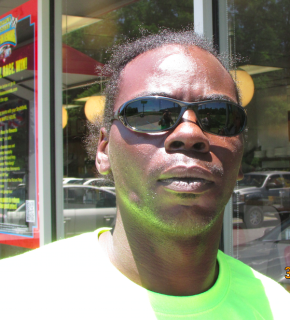
Even the sunglasses that he fashioned out of welder’s goggles don’t help. Most of the time, he says, he bumbling around in a whiteout.
He finally breaks the silence, rubbing a cyst the size of cherry on his jaw that’s been there since he worked the beaches of Dauphin Island, Alabama to help cleanup the oil of the Deepwater Horizon spill. “I’m really sorry, but what did you ask?”
The memory loss is part of the overall symptomology of Corexit poisoning, or “BP syndrome,” as it’s sometimes referred to by Dr. Michael Robichaux, one of the few Gulf area physicians to treat and document the symptoms of poisoning by crude and Corexit, the oil dispersant that BP dumped 1.84 million gallons of to hide the effects of its 4.9 million barrel blowout in the Gulf of Mexico’s Macondo well.
“BP Syndrome is not something you’re going to read about in any textbooks because the government refuses to acknowledge it exists,” said Robichaux in an interview with Bellona.
It’s not something a judge trying to work out any compensation claims for sick workers is going to hear about either. The Plaintiffs’ Steering Committee, a group of 19 court appointed attorneys who represent the hundreds of individuals and entities that have sued BP reached a proposed $7.8 billion oil spill damages settlement in 2013.
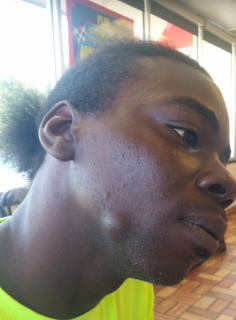
“Nine of the most common symptoms of my patients do not appear on the list of illnesses that settlement says can be compensated, including memory loss, fatigue, and joint and muscular pain,” says Robichaux. “So how are the attorneys going to file suits on behalf of those victims?”
A scientific study published 19 months after the Deepwater Horizon disaster in the peer-reviewed journal Environmental Pollution, found that sweet crude becomes 52 times more toxic when combined with Corexit.
Moore says his own attorney often pays for his doctor visits, but the prescriptions for his chronic bronchial condition that has paralyzed some 80 percent of his lung functionality is far too expensive, and the lawyer shell out. Moore makes due with a cheap asthma inhaler.
“He’s a billboard lawyer,” said Moore dismissively. “Guy’s just hoping to make a buck of my sickness and I don’t want no money, I just want to feel better, so I can walk around, hold a job.”
Indeed, Alabama State Road 39 is a forest of billboards advertising lawyers with toll free numbers promising lavish compensation.
Marylee Orr of the Louisiana Environmental Action Network (LEAN), said there is no specific organized structure for these ill workers. Her organization, in conjunction with the Government Accountability Project, the US’s most vaunted whistleblower protection organization, has assembled hundreds of legally sworn testimonies of cleanup worker illnesses.
Many, like Moore, have fallen prey to less than scrupulous oil spill chasers only to see their cases go nowhere.
A generation of lost work
Some 47,000 former cleanup workers took part in the hasty cleansing effort when the Deepwater Horizon oil rig exploded and sank. Of those workers treated by Robichaux, and dozens of others interviewed by Bellona – which is but a tiny fraction of the whole – all exhibit the signs of BP syndrome, and attest to have friends who show them too.
“I get calls everyday from people who say the exact same thing,” said Robichaux. He said their symptoms ensure that “they will never work another day in their lives.”
“This,” he says, “is a substantial blow to the workforce” in the Gulf region.
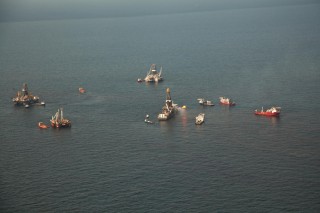
But Robichaux is convinced the problem is far more widespread than even its victims let on. “People around here don’t complain much, and the people I hear from just want to know what’s wrong with them – they are not greedy, they are just sick and want to feel better,” he said.
On average, patients seen by Robichaux are in their 20s to 40s, worked skilled labor jobs prior to the oil disaster, and have families. The decades of employment that stood ahead of them, contributing to the revitalization of Gulf’s devastated fishing communities, has been ripped away from them. That’s tens of thousands of well paid skilled labor jobs lost.
Now they are all but crippled, housebound, most often excluded from state and assistance because BP and the government don’t recognize their symptoms as resulting from the spill, and are trying to subsist on one-off hush payments handed out by BP that are running dry. Still others are waiting, like Moore, in the vain hope that they will see some settlement in the stalled case against BP that’s collecting dust in a New Orleans federal court room. Meanwhile their towns are withering and dying.
Whitewashing lost work figures
But there is really no way to quantify the loss to the workforce without a great deal of speculation. Those former workers who are lucky enough to live in Louisiana are receiving government social security checks, small though they may be, said Robichaux.
States like Alabama and Mississippi, however, offer no social security or state disability payments to ill workers whatsoever, a set of conditions the characteristically soft-spoken Robichaux blamed on the “barbaric, racist, bastards running those backward states.”
But even Louisiana is not keeping an accounting of who is receiving social aid checks for oil related illnesses, preferring, according to one worker at the state’s Social Security Administration, to call it “acute chemical sensitivity.” Hence no real dollar amount can be assigned to the work lost in connection with the Deepwater Horizon.
“A system of quantifying this would force the state and federal governments to admit there was a problem,” said LEAN’s Orr.
“The question of why there is no organization these workers can join and band together is a question that sort of answers itself,” she told Bellona. Orr said that potential plaintiffs have cannily been kept at alienated from one another with one-time medical payments from BP – with implied gag orders attached.
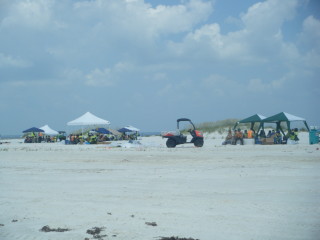
“There’s power in numbers, but keeping everyone separated like this helps BP assure that nobody knows how many people have been affected,” she said.
Not just workers affected
Robichaux, in his conversation with Bellona hinted that the loss to the workforce could be epidemic. If his patients, plus other sufferers interviewed by Bellona all know at least one more affected individual, the sweep of “BP Syndrome” is reaching well beyond the cleanup workers themselves.
One case in point is a woman Robichaux is treating who is the wife of a former cleanup worker. Another doctor with leukemia initially diagnosed her.
All she’d done was wash – or more often simply throw away – her husband’s oil and dispersant soiled clothes, Robichaux said. She, too, suffers from extreme memory loss, often driving to do the marketing only to realize she’s forgotten to put on pants. She then forgets why she went out in the first place. Then come the spasms and the nausea.
Getting ‘stuck stupid’
The salty-tongued former cleanup worker Jorey Danos, 34, from Chackabay, Louisiana, east of New Orleans, knows the sensation.
“I call that getting ‘stuck stupid,’” Danos told Bellona. He spent months working cleanup at sea a mere 12 kilometers from the gushing well.
“One minute I’ll doing my business and the next I’ll just be staring off into space, not knowing what the f*** I’m doing, just stuck” he said, and apologetically explained his choice of words. “I never really talked [like this] before working for those bastards at BP.”
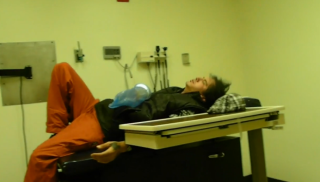
Danos, who Robichaux has treated, has a three-centimeter hole in his brain, as shown on an MRI – tissue that was chewed away by inhalation of multiple chemicals. He has three daughters, one of whom has moved to her grandmother’s because of his unpredictable behavior.
“I’m on 14 different bottles of medication and not a damn one of them is helping,” he said. “There’s the pain meds, the hydrocodone, the anti-anxiety stuff, and all the stuff that’s supposed to keep me from being psycho. [My daughter] doesn’t want to have to look at that.”
Workers threatened by BP for requesting protective gear
The boat on which Danos was working was sprayed four times by Corexit-dumping C-130s, he said, and told of one particular dump that disturbed him.
“I could see the stuff coming out of the plane—like a shower of mist, a smoky color. I could see [it] coming at me, but there was nothing I could do.”
“The next day when the BP rep came around on his speed boat,’ Danos continued, “I asked, ‘Hey, what’s the deal with that stuff that was coming out of those planes yesterday?’”
Danos said: “He told me, ‘Don’t worry about it.’ I said, ‘Man, that sh*t was burning my face—it ain’t right.’ He said, ‘Don’t worry about it.’ I said, ‘Well, could we get some respirators or something, because that sh*t is bad.’ He said, ‘No, that wouldn’t look good to the media. You got two choices: you can either get fired or you can deal with it.’”
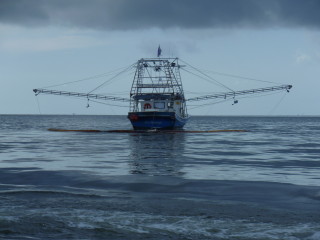
Reluctant environmentalist paying dearly for caring
Danos joined the cleanup effort for its promises of high pay – some $30 an hour – and because he comes from a long line of fishermen and felt it his due.
“I’m no tree hugger,” he said. “Do I look like some kinda hippie? No, I’m covered head to toe in tattoos – but my family has history on these waters, we’re from fishermen and I wanted to help clean up the environment.”
He’s paid dearly for it. Aside from the symptoms of his illness, which include extreme anxiety and unaccountably aggressive behavior – none of which were characteristic of him, according to one of his daughters who asked not to be named in this article – he can’t enjoy even simple pleasures.
“Sitting outside to watch a ballgame, forget it,” he said. “The heat gets to me and starts to drive me nuts, the rashes come and the pain in my stomach, it feels like its being ripped up by razorblades.”
Medical treatment equals no job
In Alabama, Moore, too, felt the affects of aerosolized Corexit by his second day on the job when he broke out in a severe bumpy rash and developed a hacking cough.
“The BP men told us it wasn’t nothing but heat rash,” he told Bellona. “But I went to see my doctor anyway. Soon as they heard about that, I was told if I went to see a doctor without authorization, they’d fire me.”
After enough requests, he was offered the service of a BP medic, who told him he was suffering from heat rash, told him to drink more water and offered no medication or advice.
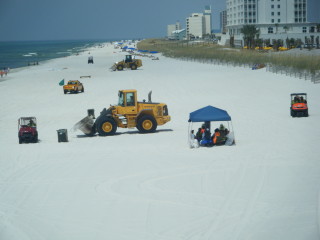
Meanwhile, Corexit bombings of him and his fellow workers became routine, despite BP safety manual rules saying Corexit was to be dropped no closer than two nautical miles to workers.
Moore was tasked with supervising of clean up brigade No.2, which consisted of 15 men who worked 96 hours a week trolling a mile strand of beach on Dauphin Island, off the coast of Alabama, covering tar and oil mats largely by hand.
“If the oil we found was more than two inches thick, we was told to leave it alone,” more said. He said the method for measuring the oil, as instructed by BP reps, was for workers to stick their naked fingers into it.
“If it came up to your second knuckle, it was more than two inches,” he said. “Then they’d come cover it up with sand. Less than two inches, they brought round a tractor and we scooped it up in our hands and put it in the bucket.”
And such was the Sisyphean task day in and day out, with nothing but the most rudimentary of protective gear, even though the BP subcontractor Moore worked for – Reliable Staffing – had plenty of hazmat suits and respirators available.
“High tides and low tides, and low tides was the rush hour, when you could see all the oil and had to decide to scoop it up or dump sand over it,” he said.
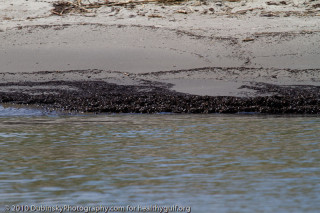
Reliable Staffing has not yet returned telephone or email requests for comment on why it denied BP-issue hazmat gear to its subcontractors. BP’s public relations department responded to an email from Bellona saying workers “were adequately protected,” that the company “was assured by all subcontractors involved that safety procedures were being observed,” and that “all safety stations and vessels were equipped with the BP safety manual.”
Danos derided that assertion: “B*llshit,” he said. “There was never any BP safety manual on our boat.” Danos’ comments are backed up by numerous similar legally sworn references in the GAP report.
Sucking towns dry by making them rich
Among the most detrimental effects to the long term economies of Gulf towns and human health were BP’s damage payout desks set up in hundreds of town and parish halls from Alabama to Louisiana, said Jack Hill, a former shrimper turned BP cleanup worker from Bayou Labatre, Alabama, who is dying of cancer from his exposure to Corexit.
“The Bayou never saw as much money as was dumped on it by BP in those first couple of months,” Hill told Bellona. “People would come in and file lost business claims with BP reps and the BP reps didn’t ask for any real substantiation,” said Hill, continuing: “And a check for $50,000 was more than most of these people had ever seen – they thought they were set for life.”
Hill said the Bayou saw a huge inundation of new cars and trucks. People bought up real estate at a furious pace. Drugs like the coveted Oxycontin flourished – as did hardcore addiction.
But as Hill and one former claims worker – who asked to remain anonymous because she signed a non-disclosure waiver – attested, collecting one of these early off-the-cuff claims meant you could join in no further action against BP.
“It was bribe money,” said the former claims worker. “BP did the math and figured that paying out a one time $7 billion dollar tranche along the coast would be cheaper than what they might lose in court, and they were right – if you collected once, you couldn’t collect again, that was it.”
Hill said that “when you get a lot of green fishermen, they do stupid things with the money – people figured the bad fishing seasons would last maybe a season and now the shrimp catch is down 60 percent from what it was before the spill and everyone is losing their shirts.”
Robichaux has been in a state of fury over the early BP payout system and likened BP’s entire handling of the situation to a foreign invasion.
“Here it is, this giant foreign company that comes into the United States, poisons the Gulf and tosses us aside like trash,” he said.
Labors for love and future lost
Lamar Moore meanwhile has finished his coffee and is standing at the far side of the parking lot at the Waffle House waiting for his ride. He can’t see well enough in the sunlight to drive. He’s visibly exhausted by the heavy Jello-humid heat lying in a slick across the Alabama coast.
“I got into this to set up my wife and me with a house, somewhere we could settle and raise kids” he confides. “Now tomorrow they’s gonna shut off our electric and we’re gonna lose the house.”
His downcast gaze shifts briefly to a beam of pride when he says, “Least the baby’s on the way.” Then his brow furrows again. “Course her first address will probably be the car.”
But new life may be a harbinger of good changes yet to come. His new daughter is due in a month. What’s here name going to be?
“Wonderful,” he says, his eyes smiling behind the welder’s glass.
This is the second in s series of stories Bellona is producing on the aftermath of BP’s Deepwater Horizon spill.

Yesterday, during its first plenary session, the newly elected European Parliament confirmed Ursula von der Leyen as President of the European Commis...

From July 1st, 2024, to December 31st, 2024, Hungary is holding the Presidency of the Council of the European Union (EU), following Belgium’s tenure....

In October 2023, Bellona Europa announced a new FedEx-backed initiative Ports2Decarb – a project aiming to maximise the role of European sea and rive...

Bellona, together with other 29 members of the industrial carbon management community and umbrella organisations, express its support to the inclusio...
Get our latest news